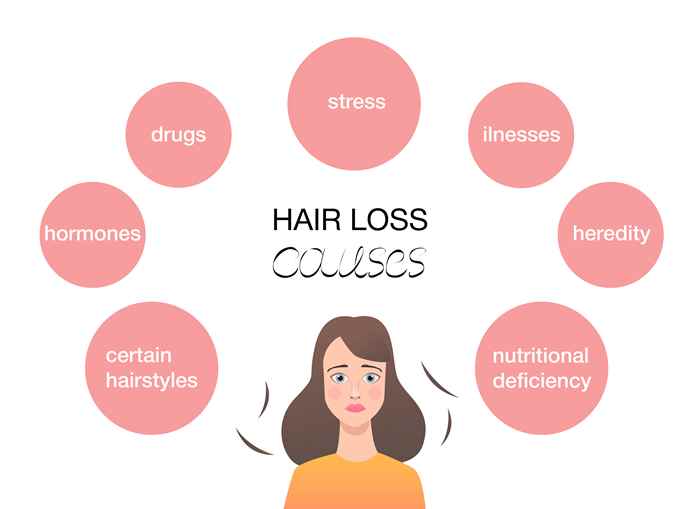Hair loss is a problem that affects millions of individuals worldwide. While it is natural to lose a few strands of hair each day, severe hair loss can be upsetting and signal an underlying problem. Understanding the common causes of hair loss will help you identify the problem and take the necessary steps to solve it. Here is a thorough look at some of the most prevalent reasons of hair loss.
1. Genetic Factors
Androgenetic Alopecia
The most frequent cause of hair loss is androgenetic alopecia, often known as male- or female-pattern baldness. In men, this inherited disorder causes a receding hairline and thinning hair on the crown, but in women, it causes thinning across the scalp. Genetics have an important part in determining the risk of acquiring this illness.
2. Hormonal Changes
Pregnancy and Menopause
Hormonal fluctuations, particularly in women, can lead to temporary hair loss. Pregnancy, childbirth, and menopause are common times when women experience significant changes in hormone levels, which can affect hair growth cycles.
Thyroid Issues
Both hyperthyroidism (overactive thyroid) and hypothyroidism (underactive thyroid) can lead to hair fall. The thyroid gland regulates many bodily functions, including hair growth. Any imbalance can disrupt the hair growth cycle, leading to hair loss.
3. Medical Conditions
Alopecia Areata
Alopecia areata is an autoimmune disorder where the immune system mistakenly attacks hair follicles, leading to patchy hair loss. In severe cases, it can result in complete baldness.
Scalp Infections
Fungal infections like ringworm can invade the hair and scalp, causing hair loss. Treating the infection often resolves the hair loss issue.
Chronic Illnesses
Conditions such as diabetes and lupus can contribute to hair fall due to the body’s prolonged inflammatory state and the stress these diseases place on the body.
4. Nutritional Deficiencies
Iron Deficiency
Iron deficiency anemia is a well-known cause of hair loss, particularly in women. Iron is essential for producing hair cell protein, and a deficiency can lead to thinning hair.
Protein Deficiency
Hair is primarily made up of protein, so a lack of dietary protein can weaken hair strands and lead to hair fall.
Vitamin Deficiencies
Vitamins such as D, B12, and biotin are crucial for maintaining healthy hair. A deficiency in these vitamins can disrupt hair growth and lead to hair fall.
5. Stress
Physical and Emotional Stress
Both physical stress (from surgery, illness, or injury) and emotional stress can lead to a type of hair loss known as telogen effluvium. This condition pushes hair follicles into a resting phase, resulting in hair shedding.
6. Medications and Treatments
Chemotherapy
Cancer treatments like chemotherapy and radiation can lead to hair loss as they target rapidly dividing cells, including those in hair follicles.
Medications
Certain medications for conditions like hypertension, depression, and heart disease can have side effects that include hair loss. If you suspect your medication is causing hair fall, consult your doctor for possible alternatives.
7. Hair Styling Practices
Over-Styling
Frequent use of heat styling tools, tight hairstyles, and chemical treatments can damage hair and lead to breakage and hair fall.
Harsh Hair Products
Using shampoos, conditioners, and other hair products that contain harsh chemicals can weaken hair strands, making them more prone to falling out.
8. Aging
Natural Aging Process
As we age, hair naturally becomes thinner and more prone to falling out. The hair growth cycle slows down, and the hair follicles shrink, leading to finer hair and more noticeable hair loss.
Conclusion
Understanding the root cause of hair fall is crucial for finding an effective solution. If you are experiencing significant hair loss, it is advisable to consult a healthcare professional to determine the underlying cause and appropriate treatment. Adopting a healthy lifestyle, maintaining a balanced diet, managing stress, and taking good care of your hair can help mitigate hair fall and promote healthier hair growth.






Comments